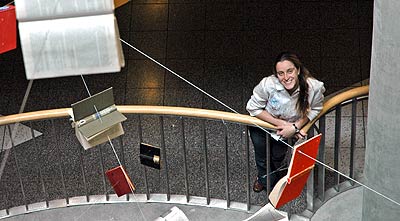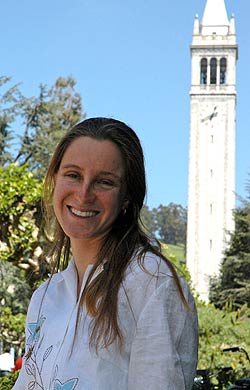UC Berkeley Press Release
 |
Alejandra Dubcovsky in the main stacks at Doe Library. The University Medalist calls the library her home away from home: she works part-time at the Bancroft Library and spends hours in others on her research. (Bonnie Powell photos) |
UC Berkeley history major wins University Medal
BERKELEY – Alejandra Dubcovsky has spent long hours teasing out the nuances of letters written by American slaves. That work, high grades and extracurricular activities that include helping the homeless and teaching local youngsters has landed her the 2005 University Medal, the highest honor for a graduating senior at the University of California, Berkeley.
 The University Medal The University MedalEstablished in 1871 by California Governor Henry Huntly Haight, the University Medal honors UC Berkeley's most distinguished graduating senior. Three to five students finalists are also named. Three previous winners have returned their medallions, then made of 14-karat gold, to Berkeley as gifts. The last to do so was Clothilde Grunksy Taylor '14, as a 90th birthday present to herself in 1981: "I received so much from the university — I had a wonderful time there — and I wanted to give a little of it back," said Taylor. Having appreciated in value 100 times, the medal was worth $4,000.  The 2005 Medalist: Alejandra
Dubcovsky, scholar
of slave letters, wins University Medal The 2005 Medalist: Alejandra
Dubcovsky, scholar
of slave letters, wins University Medal
The Finalists
|
Dubcovsky, a history major who will start work on her Ph.D. in history at UC Berkeley in the fall, said winning the medal was "overwhelming."
"I think Cal is all about you learning who you are as a person," Dubcovsky said. "You just have to go for it — you have to take the plunge."
Dubcovsky, who immigrated to Davis, Calif., from Argentina with her family when she was in the 9th grade, did just that at UC Berkeley. As soon as she arrived here, she started volunteering."It wasn't an option," she said. "It was, of course, something I should do."
In her first year, she started tutoring students at Emerson Elementary School in Berkeley and working with the homeless at People's Park. Over the course of her studies, Dubcovsky's jobs started to dovetail with her history major. She has had various internships and jobs at the Bancroft and Moffitt libraries; joined the Berkeley Historical Society; and helped revive Clio's Scroll, the UC Berkeley undergraduate history journal. She also teaches "Immigration and Identity" through DeCal, a program that gives UC Berkeley students the chance to initiate and facilitate their own accredited courses.
Dubcovsky's academic acumen was honed during the last two years doing research on slave letters as a Haas Scholar and as a McNair Scholar. The support from those two programs allowed Dubcovsky to travel to the University of North Carolina, Chapel Hill, and to Louisiana State University to analyze unpublished slave letters.
"Some of the things about Dubcovsky that impressed the committee were the level of engagement with her research on American slave letters, her contributions to the revitalization of Clio's Scroll, and her overall energy," wrote math professor Bjorn Poonen, chairman of the campus's Committee on Prizes.
Dubcovsky said her interest in slave letters stemmed from her junior thesis, which was based on slave narratives.
"When I finished my thesis, I felt that my questions were only beginning," she wrote in her essay to the prize committee. "Slave letters, a complicated and largely overlooked body of sources, portray slaves as both active agents of change and passive participants of bondage."
Dubcovsky said the letters reveal that the slaves, usually writing or dictating letters to be sent to absentee owners, did not represent themselves as slaves, but as individuals. Her work, which will result in another thesis, will show that the letters both created and complicated relationships between slaves and masters.
"I was so moved by these sources, these first-person accounts," Dubcovsky said. "I ventured into it knowing very little."
Even now, she said, when she gets discouraged or overwhelmed, she grabs the 194 letters that are the basis of her work and heads to Café Strada. She gets her coffee and, intentionally leaving behind paper or pencils, just reads through the letters. They remind her, she said, of why she is doing this work.
"They just speak to me. They are so powerful," she said.
 'Cal is all about you learning who you are as a person. You just have to go for it — you have to take the plunge.' -Alejandra Dubcovsky |
The single best thing about her UC Berkeley experience has been the people she's met these last few years, said Dubcovsky, who eventually would like to teach or become an archivist.
"The soul of Berkeley lives and moves with its people - its faculty, students and staff," she said. "I've met the people who challenged me the most here."
She particularly remembers how intimidating her first few weeks on campus were.
"Right after my first class, I went down to Sproul, and I was like, 'Oh my gosh, all these people!'" Dubcovsky said. A few days later in her dorm, she said she and a few students realized they were all "top of the class" at their respective high schools. "Here, that just doesn't matter," she said.
"It hasn't all been fun and games at Berkeley, but I've learned from all of it," she said.
As for how she maintained a GPA high enough to qualify for the University Medal, Dubcovsky is like the supermodel who eats french fries at every meal. "I stopped caring about grades my sophomore year," she said, adding that instead of taking on a crushing workload, she made a point of taking fewer classes and putting more energy into the ones she had. And she showed up at nearly every office hour her history professors held.
"They couldn't get rid of me!" she said with a laugh.
Henkin, her mentor, praised Dubcovsky's work in a letter recommending her for the University Medal.
"Alejandra stood out almost immediately as a young woman of extraordinary academic seriousness, prodigious intellectual energy, and endless curiosity," Henkin wrote. "That she has distinguished herself in the classroom and in the community while dealing with the linguistic and cultural barriers that come with immigration is in some ways unbelievable."
Dubcovsky is modest about her many accomplishments: "I have guardian angels, I think," she said.


 Getting to Berkeley wasn't smooth sailing for polyglot chemistry whiz Tanguy Chau
Getting to Berkeley wasn't smooth sailing for polyglot chemistry whiz Tanguy Chau Math major and former DeCal director Nate Singer leaves Berkeley a richer place
Math major and former DeCal director Nate Singer leaves Berkeley a richer place Computer science major David Sontag juggles both artificial and human intelligence
Computer science major David Sontag juggles both artificial and human intelligence In defending the Earth, Denise Grab
finds a way to combine her lifelong passions
In defending the Earth, Denise Grab
finds a way to combine her lifelong passions Anthropology major Kelly Fong reconstructs the Asian immigrant experience
Anthropology major Kelly Fong reconstructs the Asian immigrant experience